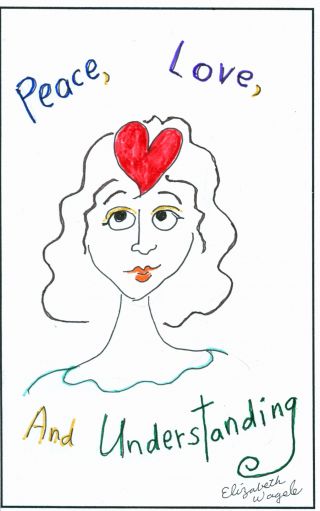
Punishment
Achieving Compassion by Using Our Heads
How to reverse self-destructive thoughts following an injustice.
Posted January 15, 2013

Drawing by Elizabeth Wagele
How can we get in touch with our compassion after something in the news or in our lives has made us feel vindictive or vengeful?
We think of compassion as an emotion of the heart. But our intellect can also be a great force for compassion. After a crime is done, we can reason that we can’t go back in time and undo it. We can realize there’s nothing to gain by whipping somebody (i.e. revenge), nor does whipping ourselves with negative emotions do any good. Compassion for self leads to compassion for others. Here’s an example:
Reasoning Out Compassion for Self
Many years ago, some young men jumped off their bikes and attacked one of my sons as he walked home late at night after visiting his girl friend. They kicked him in the ribs, breaking some of them. My primitive nature took charge and I wanted to kill these men with my own hands. After many months, compassion for myself kicked in. My son had healed, we didn’t know who the perpetrators were and never would. Negative thoughts were taking up valuable space in my mind and I wanted them out. I didn’t feel empathy for the people who did this, but I had compassion for them when I imagined what kinds of early lives they might have had that caused them to have no regard for others. I found peace.
Society and Compassion
In 2007, delusional John Delling of Idaho shot and killed two of his old friends and wounded another. He thought they were “wiping his brain” and would kill him. Idaho doesn’t allow an insanity plea so he pleaded guilty and was sentenced to life in prison. Last fall, the Supreme Court refused to hear the case challenging Idaho’s lack of an insanity defense, with Justices Breyer, Ginsburg, and Sotomayor dissenting. Neither Idaho, Kansas, Montana nor Utah have the insanity defense. This is madness. Justice Breyer wrote, "the law has long recognized that criminal punishment is not appropriate for those who, by reason of insanity, cannot tell right from wrong." John Delling is a paranoid schizophrenic. He was no more responsible for being mentally ill or the crimes he committed than my uncle was for having seizures:
Uncle Milt came to live with us for months at a time when I was around eleven. He had temporal lobe epilepsy. During his seizures he didn’t know what he was doing. He would stuff his lit cigarette between the cushions on the sofa, see magpies flying around the room, or become belligerent and want to fight. In 20 minutes he would be himself again. I would sometimes make fun of him behind his back until I grew up and developed compassion about my own fear. I couldn’t help being afraid he’d burn down our house with me in it. Then I understood he couldn’t help his seizures. After I developed compassion for myself through my reasoning, I was able to feel compassion for my uncle and find peace.
It’s natural to feel vindictive when someone frightens us, commits a heinous crime, or causes an awful accident. But we can reason that the perpetrator had a medical condition he couldn’t control. We can see our anger was misplaced. It’s more productive to pay attention to healing our loss and to become active working on improvements such as medical research, poverty, unemployment, laws, education, judicial systems, and gun control.
Chicago readers: Please see http://ewagele.wordpress.com for information about a 2-9-13 workshop/happening based on The Enneagram of Death with E. Wagele and Ruth Landis.

